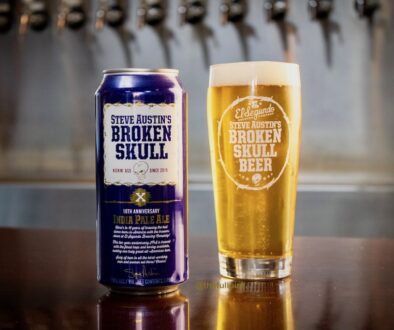Cigar City Brewing’s Joey Redner On Senate Bill 1714
 SB 1714, the Florida Senate bill which would put breweries that produce more than 1,000 barrels of beer a year on the same footing as behemoth multi-national companies that brew in excess of 100,000,000 barrels of beer a year, is, and I will not mince words, all about killing the growth of craft breweries in Florida.
SB 1714, the Florida Senate bill which would put breweries that produce more than 1,000 barrels of beer a year on the same footing as behemoth multi-national companies that brew in excess of 100,000,000 barrels of beer a year, is, and I will not mince words, all about killing the growth of craft breweries in Florida.
A recent analysis by Bart Watson of the Brewer’s Association compares the number of craft breweries and the quantity of beer produced at those breweries from states that allow self-distribution to those that do not. The analysis, unsurprisingly, shows a very strong link between less regulation of access to market for breweries and the total number of breweries and barrels of beer produced by those breweries.
Senator Kelli Stargel of Lakeland, a Republican and SB 1714’s sponsor, has repeatedly defended this over-regulation, even though it places onerous new limitations on businesses that have invested millions of dollars in Florida. Those dollars were invested based on an existing law (a law from 1963) allowing breweries to sell their pre-packaged beer in direct retail sales on the brewery premises. Senator Stargel would blithely wreck those businesses based on the notion that, as she is fond of saying, we must protect the three-tier system. To which I ask, “Why?”
Breweries are federally regulated in a way that few other businesses are. Breweries directly pay federal excise tax on all the beer they produce and are required by federal law to keep detailed reports of all the beer they produce, accounting for every step in the process from fermentation on through to packaging. Breweries are required by federal law to submit formulas for any adjunct recipes directly to the Tax and Trade Bureau and to submit all labels and keg collars for federal approval. Breweries must register with the FDA and follow all OSHA regulations that apply to light manufacturing. Brewery advertising is subject to direct federal oversight.
In short, brewery owners are (however reluctantly) masters of dealing with government oversight and red tape. Yet, Senator Stargel not so subtly suggests collecting state beer taxes is something that breweries are ill equipped to do? The notion flies in the face of reason.
So if collecting state beer taxes is not the reason for protecting the sanctity of the three-tier system, what is? Well, if you believe Mitch Rubin, the lobbyist for the Beer Wholesalers of Florida, the three tier system is a long standing tradition and for that fact alone it is worthy of being preserved. Apparently it takes a lot of money to remind our legislators of what a long standing tradition it is. The FBWA doesn’t keep a website to link to but they do have a very active PAC. But the truth that will never pass Mitch Rubin’s lips is that states without exceptions to the three-tier system are the exception, not the rule. The three tier system in the vast majority of states specifically allows small breweries to operate in multiple tiers.
And the vast majority of states allow direct retail sales by breweries like those currently allowed under Florida law. Most without limit. Yet in all of these states private distributors still exist. In fact, many of the largest distributors are located in states with self-distribution. How can that be?
Well, the first reason is that distribution is a tough business. Like brewing, distributing beer is capital-intensive, heavily regulated, and requires managing a dizzying array of moving parts. As with anything that is difficult to do, those that can do it well add value to the system. A good distributor that can get beer to market more efficiently and with less overhead provides value to breweries and to consumers.
Fun fact: Most breweries, even in states where self-distribution is an option, ultimately choose to work with a distributor. Not because the government tells them to, but because it is a mutually beneficial business relationship. In the case of Cigar City Brewing, you couldn’t pry me away from my distributor with a crowbar! They do a phenomenal job representing Cigar City and through their hard work they bring value back to the brewery.
Those are the kinds of relationships government should foster; mutually beneficial partnerships, not government mandated servitude.
Another objection to brewery retail sales is that it is unfair to the retail tier. The retail tier is without a doubt the most important tier in the three tier system and retailers are unquestionably the foundation on which the entire beer industry exists. But to suggest that breweries selling beer for retail sales is unfair to the retail tier doesn’t hold up to close speculation.
Recall that the majority of states allow breweries to directly retail beer and/or self-distribute and yet in those states there is still a strong retail presence of both on-premise and off-premise accounts. In fact, the #1 rated beer bar in the world, Mekong, is located in Virginia, a state that allows self-distribution and direct brewery retail sales. California too features some of the largest beer retailers and most highly rated beer bars despite operating in a state that allows self-distribution and direct brewery retail sales. Also, recall that breweries that operate in the retail tier and the production tier also carry the expense of both tiers and pay all of the taxes associated with both tiers.
Like with distributors, retail accounts that add value by providing good pricing, service, and a great atmosphere thrive all across the United States, even though the majority of states allow self-distribution and/or direct retail sales by breweries.
As most states have witnessed and Bart Watson’s analysis strongly suggests, the only obvious reason to disallow the long standing exceptions to the three tier system is to curtail the growth of craft breweries.
Which brings up the question of why the Florida Beer Wholesalers Association (mainly AB-InBev distributors) would be so vehemently against the growth of small breweries in Florida while the Beer Industry of Florida (MillerCoors distributors) have publicly come out in opposition to SB 1714.
My best guess is that the opposition by the Beer Wholesalers of Florida to the growth of Florida’s small breweries is a remnant of the old Anheuser-Busch distribution model. Because A-B had such incredible market share dominance for so long (and still does), A-B as a brewery benefited from having more distributors in smaller footprints.
Meanwhile, Miller and Coors had much less market share and so naturally had to cover much wider swaths of territory to garner the same amount of sales. Today in Florida there are 22 A-B InBev distributors and only 7 MillerCoors distributors. By the nature of craft beer being a 6% share in Florida, distributors with smaller territories are not as well positioned to benefit from the sale of craft beer. The A-B InBev distributors literally have fewer accounts to sell craft beer into than the MillerCoors and smaller independent distributors with their much larger territories. And the impact, however nominal, of even one on-premise brewery selling beer at retail in an A-B distributor’s territory is felt more acutely when the pond is that much smaller.
So in many ways the A-B distributors have less to gain from craft, but do they really have more to lose? Quite simply, no. There is no legal reason why these distributors cannot expand beyond their current footprints. Brown Distributing based out of West Palm Beach has done so and now sells craft beer statewide. Cigar City Brewing proudly works with Brown throughout much of the state.
There may be many calculated reasons why A-B distributors have not expanded their footprints. Many have speculated a major reason is fear of A-B InBev reprisal or hope of acquiring additional A-B territory via consolidation if they play nice with A-B InBev.
Whatever the reason for their decision not to adjust to the changing landscape of consumer taste and business climate, seeking to legislatively restrain the growth and expansion opportunities of other Florida business owners flies in the face of free market capitalism.
As I have illustrated, the notion that breweries selling beer directly to consumers is somehow a weird Florida anomaly is patently untrue. In fact, most states allow direct retail sales and in fact go Florida a step further and allow direct self-distribution. And yet distributors and retail accounts still thrive in these states.
But what is truly galling about SB 1714 is that the distributor owners who are pushing for it know full well that most states allow retail sales and/or self-distribution. These distributor owners and their employees travel all across the country courting out of state breweries so that they can sell their products here in Florida. They also know that in many states A-B InBev themselves self-distribute.
And these Florida Beer Wholesaler Association member owners know full well that every single day their trucks will pull out of their warehouse laden with beer from states that allow retail sales and self-distribution and the inherent advantages that come with it. If distributor members of the FBWA realize their legislative ambitions, they will knowingly and happily put the Florida breweries they represent at a severe competitive disadvantage. All so they can make a few more dollars.
Joey Redner
Founder/CEO
Cigar City Brewing
www.cigarcitybrewing.com – @CigarCityBeer – facebook




Craft Beer By The Numbers: April 2014 | Craft Beer and Brewing Magazine
April 30, 2014 @ 6:17 am
[…] 1714: SB1714, that is. It’s the Florida Senate bill that will ban breweries from selling their product directly to the public if they sell more than 2,000 kegs of beer a year, and possibly cause Cigar City Brewing to flee from the state, if passed. Check out Cigar City owner Joey Redner’s response to the bill. […]
April 28, 2014 @ 2:31 pm
I’m outraged and embarrassed by Republican lawmakers supporting FL State Bill 1714. It’s anti-competitive and goes against Republican philosophy. What’s next, Trader Joe’s supermarket needing to use Public’s transportation to deliver food? If this bill passes and any Hillsborough CO Republican voted for it, I will do everything I can including voting every one of them out of office. If they want protectionist ideas, join the Democratic party.
Old Soul Brewing, S 1714, Burger With An ABV, MLB And Beer, Pandas And More! | Worst Beer Blog Ever
April 27, 2014 @ 6:35 am
[…] Cigar City Brewing’s Joey Redner On Senate Bill 1714 … […]